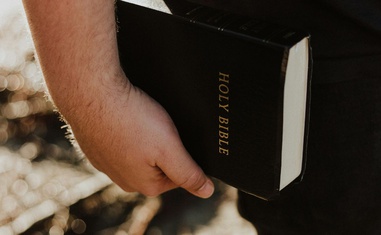The views expressed in our content reflect individual perspectives and do not represent the authoritative views of the Baha'i Faith.
In this series of essays, I’ll attempt to share my personal spiritual odyssey, which spans continents and cultural landscapes, from the Worldwide Church of God to the Baha’i Faith.
Like the Israelites under Moses, wandering through the desert for 40 years, in search of the promised land, I transitioned, very slowly, and on a seemingly circuitous route, often crisscrossing familiar terrain, from time to time seemingly lost and directionless, from a commitment to Christianity to a deeper and wider devotion to the Baha’i teachings.
RELATED: Why a Harlem Baptist Preacher Became a Baha’i
How does a theologian, a pastor, and a committed Christian like me leave that lifelong path and embark on the spiritual journey the Baha’i teachings offer? I’ve chronicled the full narrative — a complex weave, with threads encompassing trials and triumph — across three books: “The People of the Sign,” “The Hardness of the Heart,” and “The Rod of Iron.” This trilogy encapsulates the evolution of my beliefs and values as I navigated the complexities of religious exclusivity on a path toward diversity and unity.
Let’s start at the beginning.
Rise to Prominence in the Worldwide Church of God
Even as a child, I wanted to somehow serve in the spiritual realm.
My ascent within the clergy of the Worldwide Church of God saw me immersing myself in linguistic pursuits, mastering German, French, Swedish, and learning enough Russian to be dangerous, in my desire to be of service to God, wherever He might send me.
This led, increasingly, to opportunities to serve passionately in Church of God youth programs in Scotland, South Africa, Germany, Austria, and the United States. This service in turn led to pastoring churches in Germany, Switzerland, and Estonia, and successes behind the Iron Curtain — in Poland in particular, and during a pivotal trip to Russia, during the coup that led to the demise of the Soviet Union. My dedication, and these experiences, resulted in my appointment as Assistant and subsequently Interim Director of Family Ministries Globally, at the Worldwide Church of God headquarters, in Pasadena, California.
My spiritual path seemed set in stone, but I could not foresee what I would encounter on it.
Understanding the Mosaic of Beliefs
The unraveling of the Soviet Union, which I witnessed firsthand, paralleled the schism that ripped the Worldwide Church of God apart, just as I personally rose to global prominence within that organization.
I had sympathy with, and understanding of, the differing perspectives of the three major sides of the doctrinal schism, as each of the squabbling factions sought to recruit my participation. Through these diverse experiences, I gained profound insights as I witnessed the shared human inclination to believe in the righteousness of one’s convictions. It became evident that, irrespective of nationality, religion, ideology, or identity, individuals everywhere believe their views to be correct and, therefore, hold them to be the sole solutions to humanity’s challenges.
Recognizing the Puzzle Pieces
Crucially, my journey helped me realize that part of the answer is, indeed, contained within each person’s beliefs. I slowly realized that from South Africa to Sweden, from Switzerland to the Soviet Union, from Israel to Estonia, people were driven by a sincere desire to contribute to the betterment of humanity.
However, the mosaic of diverse perspectives also underscored the importance of recognizing that, while everyone may have one or more pieces, no one person possesses the complete puzzle.
Eventually, it became clear to me that, in failing to reach an agreement between ourselves, none of us had all the answers. So, I resigned from my position to separate my faith from my paycheck, initiating an independent exploration of truth and a search to find where God was most active among the faithful.
I literally traveled around the world, eventually focusing on India, before finding the answer I sought in my backyard.
I first encountered the Pasadena Baha’i community because they formally met in one of the now-defunct buildings established by The Worldwide Church of God, on the extended campus of Ambassador College, where I obtained my degree in theology. I had served, as a student, decades earlier, in this very building — the Western Justice Center.
God does indeed have a sense of humor.
A Journey to Belonging
My own conversion from Christianity to the Baha’i Faith testifies to the power of seeking unity amidst doctrinal differences.
I had learned, in the factionalism I encountered, that none of us have all the answers. When we pretend, or worse, profess that we do, it leads to the opposite of peace — disunity, discord, and division. It tears people apart rather than unifying them.
The Baha’i Faith, embracing diversity rather than division, offered me a spiritual haven where differences are valued, not condemned. The Baha’i teachings call for intellectual coherence and spiritual commitment — the cornerstones of building the religious harmony we all desire. None of us can achieve that alone. Alone, we can go fast, but often in the wrong directions. To go far, we need to go together.
Sharing Insights, Seeking Harmony
The Baha’i principle of human oneness deeply resonates with all the lessons, sometimes hard-won, from my personal faith journey. I saw what disunity can do to people and institutions and learned that despite our differences, we’re all threads in the rich tapestry of humanity. Only by recognizing and respecting each other’s perspectives can we truly grasp the whole picture, guided by the divine revelation’s gentle light.
When I learned about that most recent revelation, newly brought to humanity by Baha’u’llah, the prophet and founder of the Baha’i Faith, it changed everything.
Beyond Division, Embracing Unity
The Baha’i teachings assure us that humanity’s unity is divinely assured — but the path toward that unity demands conscious effort and unwavering commitment.
When I first encountered the Baha’i Faith, I felt deeply moved by a 2002 letter from the Baha’i Faith’s supreme body addressed to all of the world’s religious leaders. Titled “One Common Faith,” it was critical in helping me personally, and you may wish to check it out here.
RELATED: Am I a Baha’i?
That letter, written by the Universal House of Justice, the democratically-elected global administrative institution for all Baha’is, begins in this hopeful, loving way:
To The World’s Religious Leaders
The enduring legacy of the twentieth century is that it compelled the peoples of the world to begin seeing themselves as the members of a single human race, and the earth as that race’s common homeland. Despite the continuing conflict and violence that darken the horizon, prejudices that once seemed inherent in the nature of the human species are everywhere giving way. Down with them come barriers that long divided the family of man into a Babel of incoherent identities of cultural, ethnic or national origin. That so fundamental a change could occur in so brief a period — virtually overnight in the perspective of historical time — suggests the magnitude of the possibilities for the future.
The Baha’i teachings, I learned, exemplify religious unity as a missing piece in our collective human quest for peace, security, and justice.
Their call for intellectual coherence and spiritual commitment echoes the core Baha’i principle of oneness, which invites all people to:
Raise ye a clamor like unto a roaring sea; like a prodigal cloud, rain down the grace of heaven. Lift up your voices and sing out … Quench ye the fires of war, lift high the banners of peace, work for the oneness of humankind and remember that religion is the channel of love unto all peoples. … Such is the way of the Lord. Such are His bestowals. Such, from among His teachings, is His precept of the oneness of mankind.
…Then will aggression crumble away, and all that maketh for disunity be destroyed, and the structure of oneness be raised — that the Blessed Tree may cast its shade over east and west, and the Tabernacle of the singleness of man be set up on the high summits, and flags that betoken love and fellowship flutter from their staffs around the world until the sea of truth lift high its waves, and earth bring forth the roses and sweet herbs of blessings without end …
Those inspiring verses, written by Abdu’l-Baha, the son and successor of Baha’u’llah, ask us to explore how all major religions, often seen as divisive, actually guide us towards universal principles of love, acceptance, and unity. By applying our intellect, we can bridge the seeming gaps between faiths and achieve true unity.
Now that I had discovered these new teachings, I wanted to know more.

















Comments
Sign in or create an account
Continue with Facebookor